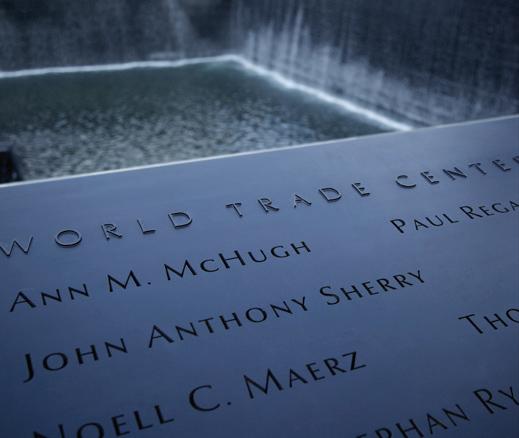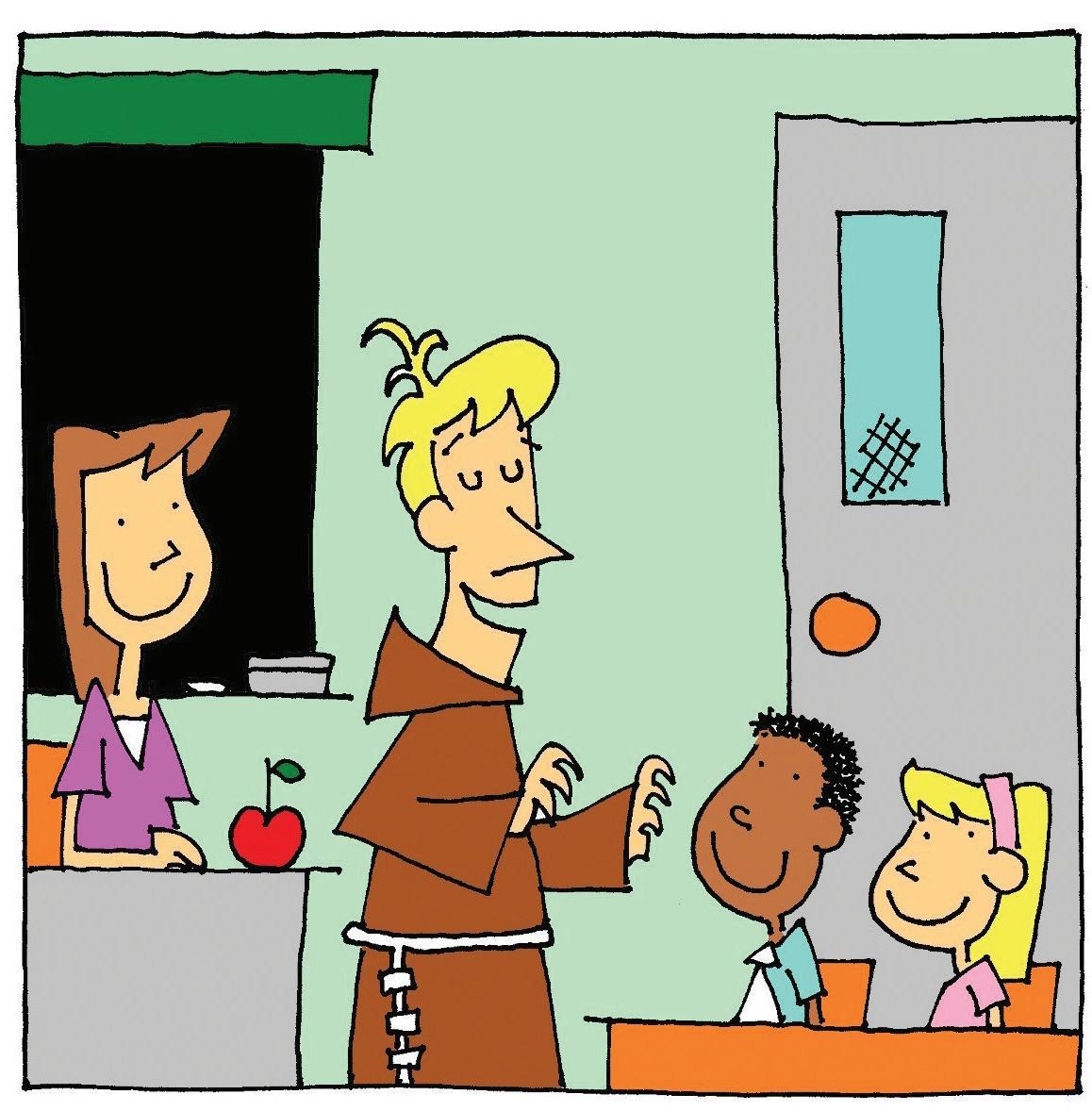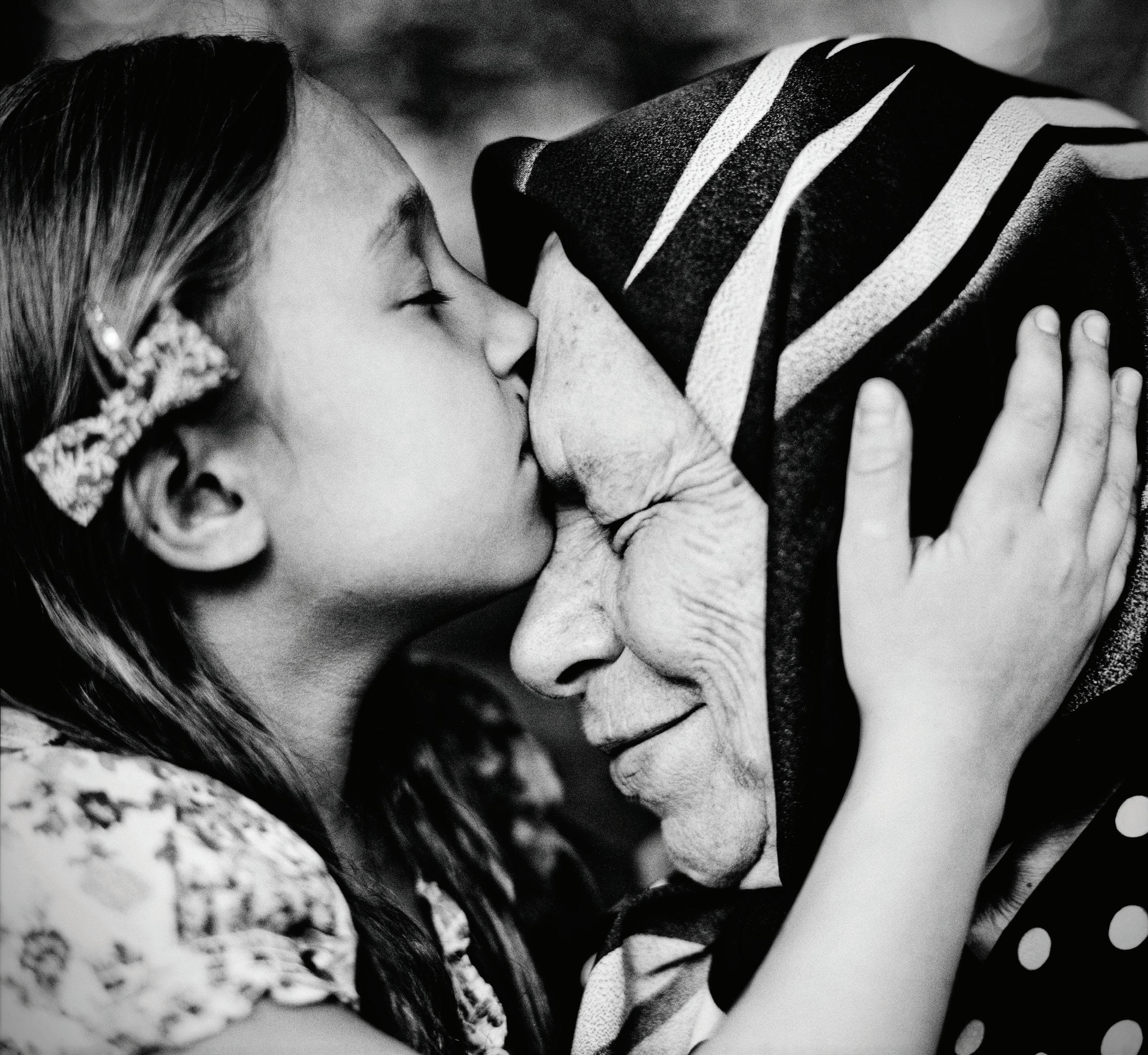
10 minute read
Faith & Family | Susan Hines-Brigger
Susan Hines-Brigger with her son, Alex
Susan has worked at St. Anthony Messenger for 27 years and is an executive editor. She and her husband, Mark, are the proud parents of four kids— Maddie, Alex, Riley, and Kacey. Aside from her family, her loves are Disney, traveling, and sports.
Advertisement
Susan welcomes your comments and suggestions!
EMAIL:
CatholicFamily@ FranciscanMedia.org
MAIL:
Faith and Family 28 W. Liberty St. Cincinnati, OH 45202
WANT MORE? VISIT: FranciscanMedia.org/ faith-and-family
Passing on History


For most of us, there are certain moments in time that remain frozen in our memories forever. We can recount every detail of the event, such as where we were, what was happening, how we felt. Sometimes those memories are joyful—weddings, births, victories. Other times they stick with us because they strike us to our core in the worst way—deaths, accidents, tragic events.
I can still remember my parents talking about the specific details of their experiences surrounding large-scale events such as the atomic bombing of Hiroshima, the Vietnam War, and the assassinations of President John F. Kennedy and Martin Luther King Jr.
My generation—Gen X—has its own set of memories, as each generation does. For us, some of the major events that shaped our worldviews were the Challenger disaster, the Columbine school shooting, the Iraq War, and the Oklahoma City bombing.
And then there is the all-encompassing memory of 9/11. This memory touched all generations, rocking our sense of security to the core.
A WHOLE NEW WORLD
At the time of the attacks, I was three months pregnant with my son, Alex. I had gone in to work long enough to hear about the first plane hitting the tower, discussing with my colleagues what a terrible event it was. But then, thanks to morning sickness, I had to head home. I was lying curled up on the couch when the second plane hit. And then there was the Pentagon, followed by the news of the plane in Shanksville, Pennsylvania. It all seemed so surreal.
I remained in that position on the couch for hours, watching the coverage and praying for all those involved. All the while, I kept holding my stomach, wondering exactly what kind of world I was bringing my child into.
I can still recall all the details of the following days of the attack. We live near an airport, and I remember the eerie quiet without the planes flying over our house and the rampedup security everywhere we went. We watched the constant news coverage, searching for answers and hoping for survivors. We saw the photographs posted in the media of loved ones who were missing, in the hopes that they might have survived and just hadn’t been located yet.
During those days, I did what I knew how to do. I wrote. I wrote letters to both Alex and his older sister, Maddie, about the event and tucked them into each of their baby books. I wrote from my heart, telling them not only the facts of the day, but also about the emotions and lessons we can learn from this horrible event.
TELLING THE STORIES
Now, 20 years later, my son, who was on the couch with me that horrible September day, doesn’t have any sense of the horror that took place. In fact, neither do most members of his generation.
And that’s where we as parents, grandparents, aunts, uncles, and all those who remember that day and others come into play. Just as we listened to stories from previous generations about events that we did not personally experience, we need to talk about the memories and the lessons we learned on 9/11. When I interviewed Father Chris Keenan, OFM, about his involvement with the 9/11 attacks in New York (see page 32), I asked him what we can do now to keep the memories of that day alive. He said to tell the stories, which is how we will keep history alive.
Iwasn’t alive for 9/11. As my mom wrote on the previous page, she was three months pregnant with me when the events of 9/11 took place. From my perspective, 9/11 seems like the distant past, much like the other important events that have happened in American history.
Most people know about 9/11 due to its recency, but its impact is what I believe is lost. In the same way people born after something like the Vietnam War can never fully understand the social impact that came from it, people in my generation can begin to learn about 9/11 but never fully understand, as if looking at it behind glass at a museum. We are told about the four planes and how they were used to attack points of interest in the country, but never taught the reasoning or the changes that have been made because of it.
Throughout my life, I feel that national events are becoming less impactful and more abundant. With the power of technology in our pockets, we can see more terror happen and feel less because of how often it occurs. When these problems are oversaturated in our minds, it is harder to see standout problems.
We are constantly being bombarded with issues and events at a younger age. It has caused many people in my generation to question bringing children into this world. I think it is a problem that has gotten worse. While parents, like mine, would have it as an afterthought and continue to do their best to protect the life they brought into the world, people in my generation are beginning to shy away from being parents, scared of what the world will look like in the coming decades.
It is a complex issue, but I believe that human resilience will help us get through any problems we face. Every generation has and will have problems, but it is important to work together and overcome them with faith and love.
What happened on 9/11 was a piece of national history, and we should continue to listen to the stories being told to create a better future.
Alex Brigger
—Alex Brigger

Friar Pete & Repeat
These scenes may seem alike to you, but there are changes in the two. So look and see if you can name eight ways in which they’re not the same. (Answers below)


Shannon K. Evans
Shannon K. Evans is a frequent contributor to St. Anthony Messenger and is the author of Rewilding Motherhood: Your Path to an Empowered Feminine Spirituality (Brazos Press). She and her family make their home in central Iowa. Find out more on her website, ShannonKEvans.com, or follow her on Instagram at @ShannonkEvans.
WANT MORE? Check out our daily online prayer resource, Pause+Pray: FranciscanMedia.org/ pausepray
An Interfaith Prayer

The 9/11 Memorial, which opened in 2011, includes two reflecting pools where the North and South Towers once stood.
On the 20th anniversary of 9/11, I am reflecting on how the world has changed since that day—and how the way that I experience the world has changed. When I watched the planes hit the Twin Towers from the TV in my freshman dorm room, I understood very little of US relations with the Middle East or of Christianity’s relations with Islam. But like all Americans, I immediately found these issues taking up newfound space in my mind.
As I watched my country cope with such grave trauma over the ensuing weeks and months, I felt simultaneously proud of the American spirit and newly fearful of Muslim people. Those were confusing times; many of us likely experienced prejudices and fears that we are not proud to admit. Twenty years later, I understand just how painfully common it has been throughout history for one religion to do harm to another—Christianity included.
How do we overcome fear and hatred of those who are different? Scripture tells us that perfect love drives out fear. There is not much action that most of us can take on the world stage, but we do have control over how we live our personal lives. In our own spheres, are we choosing to build bridges or walls? Are we being peacemakers in the spirit of St. Francis, who risked his life to befriend the sultan of Egypt, Malik al-Kamil, during the Crusades? Or are we spreading further fear and division by refusing to focus on our common humanity?
MYSTERY OF GOD
Since 9/11, I have attempted to educate myself on religions that differ from my own to combat the negative stereotypes and fears that arose from that tragedy. I’ve done this by seeking to learn about other faiths from people who sincerely practice them. The truth is that God is not exclusive: No single tradition or culture can communicate the entire mystery of God to the human spirit.
We Christians have an unfortunate tendency to assume we don’t need the perspective of anyone else, but that’s not true. Many of our beloved spiritual writers and thinkers formed their ideas through dialoguing with other religions or through secular philosophy. I’ve heard it said that trying to understand God is like feeling an elephant while blindfolded. One person will describe a tail, another a trunk, another a leg—and all the descriptions are true! But they only accurately
reflect the elephant when they are put together. When we take each other’s experiences of God into account, we are left with a picture of the divine that is truer to the mystery of the whole.
We need each other’s experience and wisdom. We gain so much by listening—and we only miss out when we write one another off as ignorant or heretical. All people are made in the image of God, and so all the ways we seek a relationship with God are beautiful and sacred. When interfaith listening is done with an open mind and genuine desire for spiritual growth, it can be a deeply enriching practice in the Christian life.
FRUITS OF THE HOLY SPIRIT
When we seek to know and understand those of other faiths, it becomes more natural to pray for them. Praying for peaceful relations between differing religions has enormous consequences in people’s lives. Christians have a responsibility to pray for religious leaders around the world—to dialogue and relate with one another. Our prayers for world peace must begin with prayers for peace between religions.
Additionally, our personal prayer life can benefit from interfaith experiences because they can unlock our spiritual imaginations. We all know the feeling of a dry soul; sometimes hearing a new vernacular and encountering different approaches to prayer can serve as a glass of water in the desert. As we honor the spiritual expression When our imagination grows stale and our relationship with God of others, we often feels at a standstill, the find more mercy in curiosity piqued by our hearts. new ways of seeing the divine can offer us new tools for the journey. Prayer might just become wondrous again. And in making room in our hearts for different ways that others reach for God, we are likely to notice the Holy Spirit’s expansion of our ability to keep the commandment to love our neighbor as ourselves. As we honor the spiritual expression of others, we often find more mercy in our hearts. Instead of labeling others “wrong,” we find the fruit of the Holy Spirit at work in our worldviews and relationships. This, too, is building our prayer life. In fact, could anything be more of a testament to growth in prayer than experiencing increased love for others?
HARMONY THROUGH DIALOGUE
Dear God,
I know you reveal yourself to all people. Help me honor my fellow humans on their faith journeys, knowing that doing so deepens my own spirituality. May the religious leaders of the world dialogue with one another in a spirit of love and unity.
Amen.
PRAYERFUL TIPS WAYS TO ENGAGE WITH OTHER FAITHS
• Visit a synagogue, temple, or mosque with a friend of another faith.
• Follow people of other faiths on social media, listen to their podcasts, or read their books to find out how honoring their pursuit of God can help you with your own.
• Be curious and ask questions about what you learn. For example, “What are the strengths of this faith expression that I might benefit from implementing myself?”
• Pray for peace and goodwill between all nations and religions.











